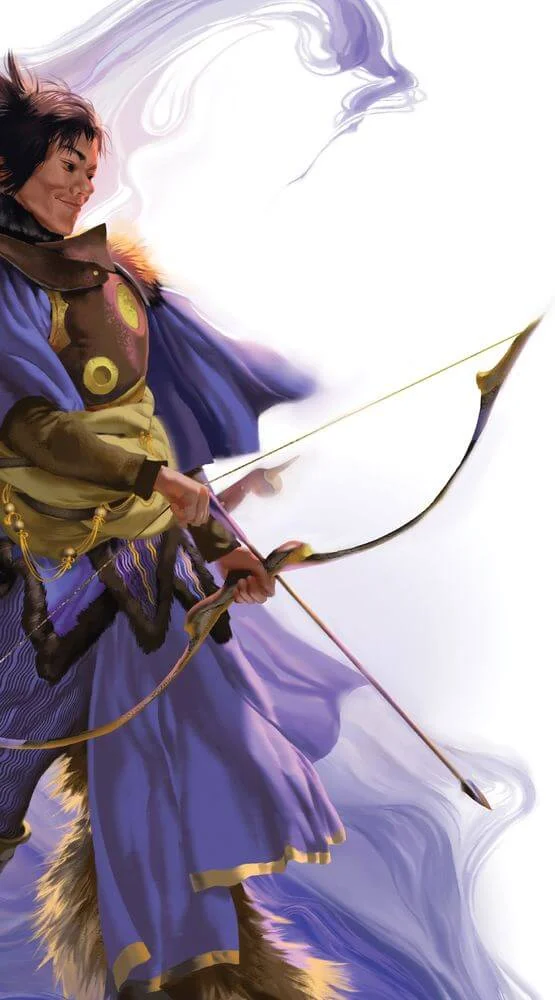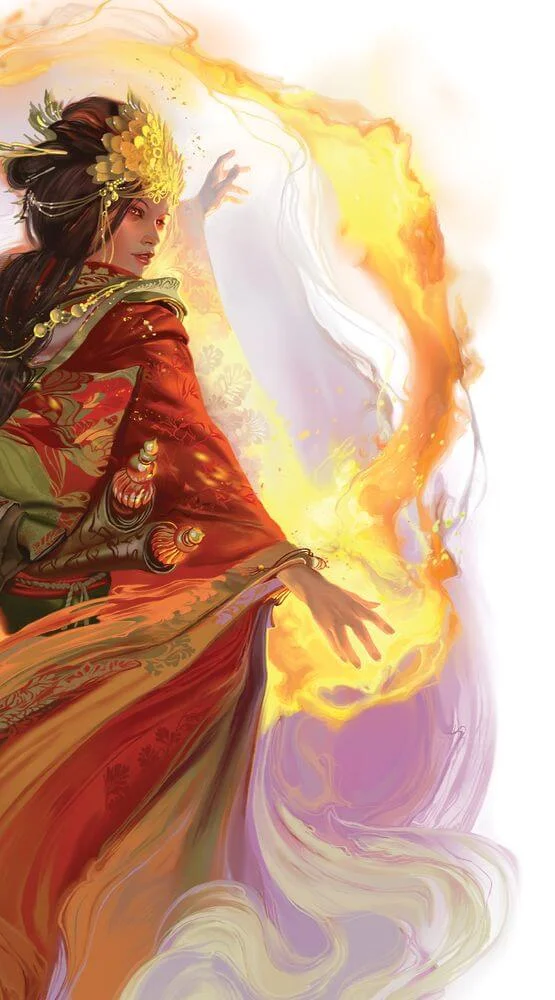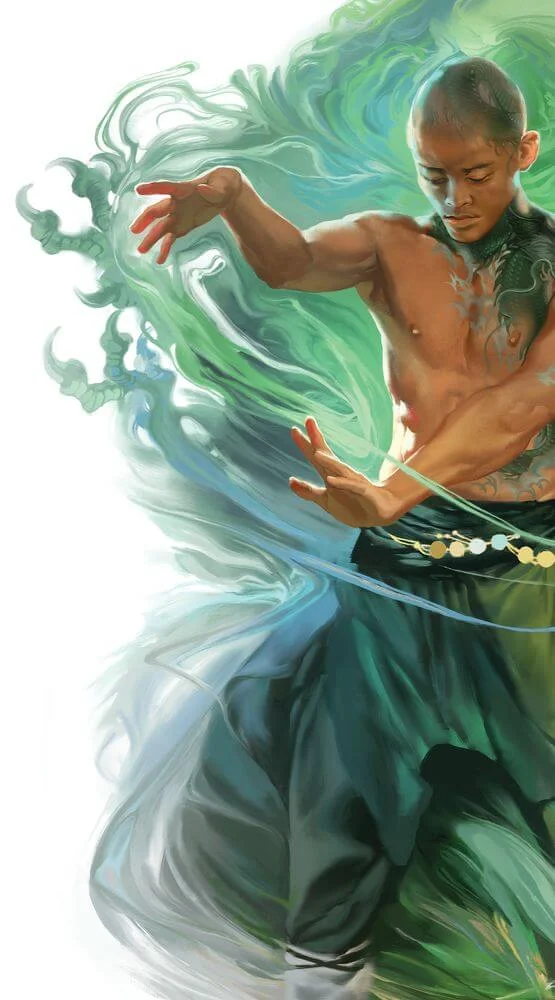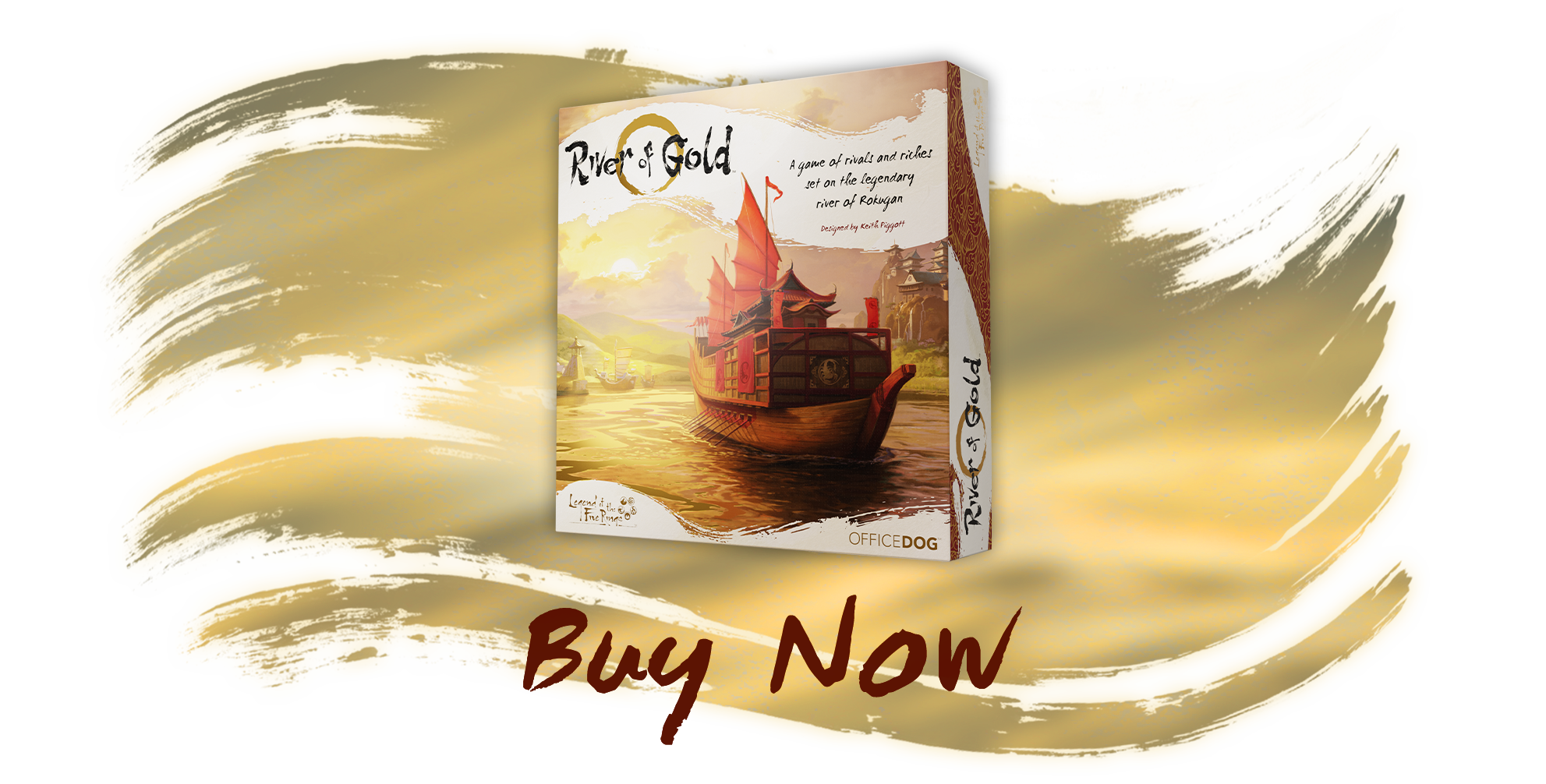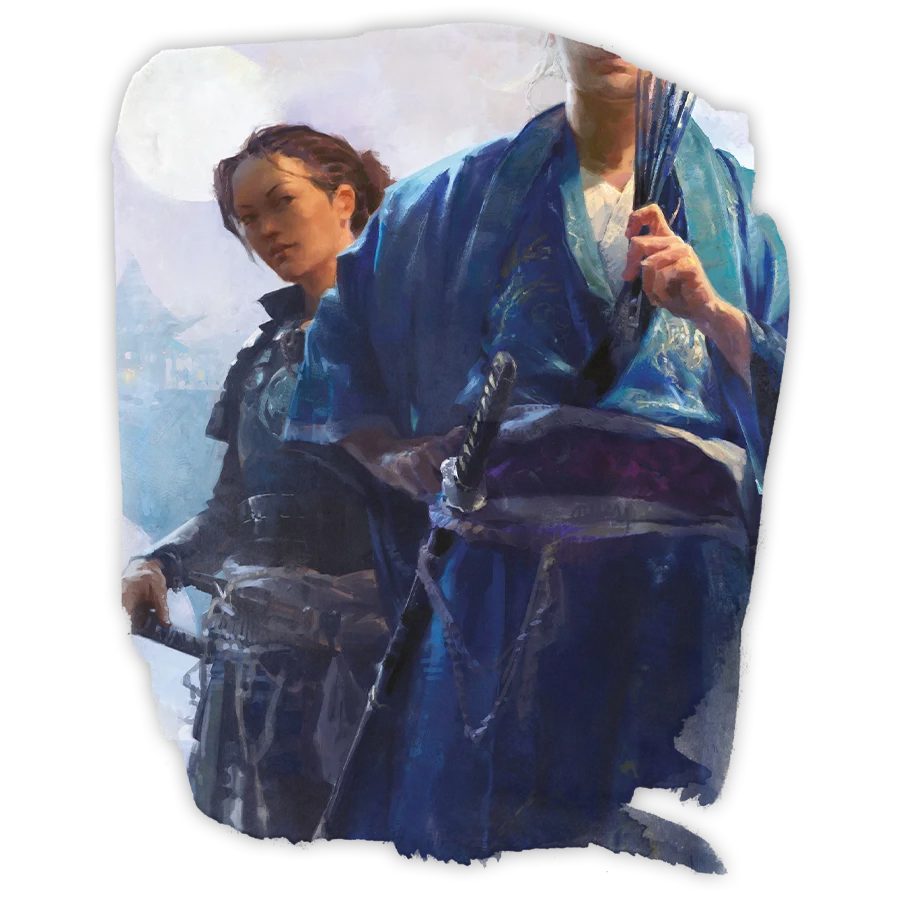River of Gold Part 1
Read or listen to the first story in the ongoing series
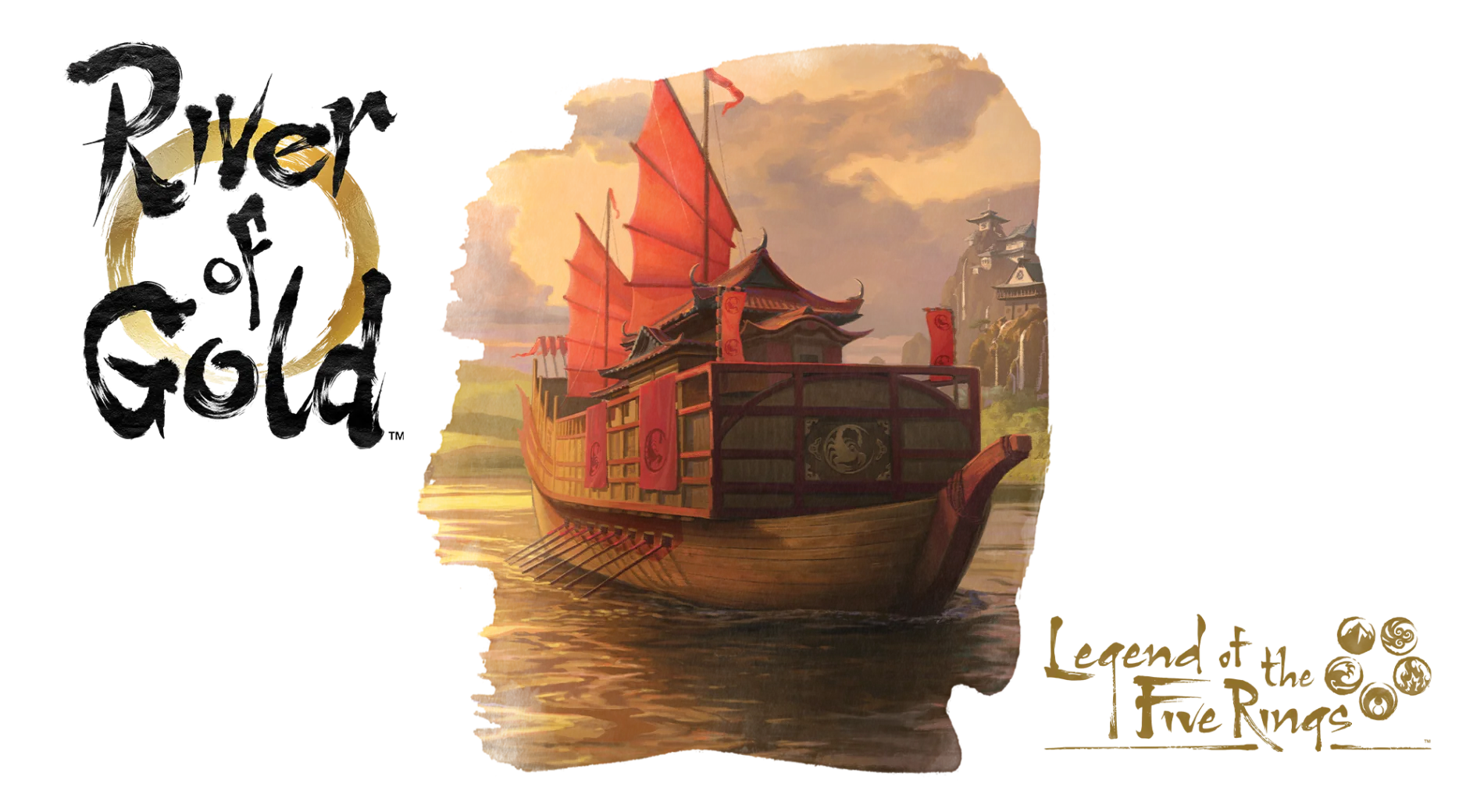
In the realm of Rokugan, the fabled River of Gold stands as a testament to boundless prosperity. Along its shimmering currents, affluent merchants sail from one port to another, painstakingly crafting vast trade empires.
But now, a dangerous ship’s captain calling himself the pirate prince” threatens to disrupt the flow of gold and goods along the river. With a fleet of deadly river pirates sailing under his command, he’s about to launch his most daring raid yet, and issue a stark challenge to the samurai lords of the Crab, Crane, Scorpion and Mantis Clans: “Let the river’s bounty belong to whoever has the strength to take it.”
This is part one of the River of Gold short story series. To find out more about the River of Gold, and how you can influence the outcome of the series, click here, or scroll down to enjoy this episode in your choice of text or audio…

Part 1: River of Gold
by Robert Denton III
The maps did not explain why it was called the River of Gold. Locals attributed its name to how it appeared each dawn, Lady Sun awakening to paint the rippling waters behind the riverboats a golden hue. Merchants took the name literally; everything the river touched thrived, especially the coffers of those who stocked the marketplaces and harbors along its fertile banks. Tāke also called it the River of Gold, but he preferred to keep his reason secret.
Tāke plunged his quant pole down, halting his boat just in time to avoid collision with a heavy merchant barge. The man on the other boat raised a hand in apology. Tāke smiled in response – no harm done. The river was busy today, and there wasn’t a lot of room to maneuver.
In fact, the River of Gold was busier than he’d seen it in some time. Barges stacked with goods drifted in tight rows with pleasure boats scattered throughout, all seeming like a floating city on the water. The Emerald Empire had other rivers – some natural, some engineered as public works, and one or two that were carved by Fortunes – but none were this wide or calm, nor were any of them a direct waterway from the north that emptied into the southern bay.
“There.” Kyozo pointed to where the eastern bank grew rocky and tall. A port community clung to the rising cliffs, towering above docks in houses carved into the very rock. Above, an old lighthouse jutted from the port’s only shrine, its many crimson flags fluttering in the morning breeze. The largest of these banners was emblazoned with the symbol of a white hare. This shrine – and the riverside town tucked beneath it – was within the territory of the Hare Clan, one of the Emerald Empire’s many samurai clans.
But only a minor clan, Tāke reminded himself. It was the Great Clans who truly ruled Rokugan. He was surprised that “minor clan towns” like this still survived along the river. Hadn’t the Great Clan families, with their unchecked expansion, seized them all?
Tāke glanced at the crate of papers resting at his feet, then swung his eyes upward to the shrine, which perched like a drunken bird on the edge of the cliff. Was it his imagination, or did it sway a bit? He pictured himself and Kyozo clinging to crumbly steps, their hands full and straining from the crate, the ancient structure above creaking threats to collapse. But the shrine had held all these centuries so far. Once done, they would return the way they came.
Of course, a return trip meant the headache of struggling against the current. Tacking up the river while it was this crowded was a sure way to cause a collision, and hiring a boat-puller to tow their craft from the land with oxen was out of the question.
Once every other month, an old shindōshi communed with the river spirits, reversing the river’s current for a single day. He did this purely out of charity, and he was getting on in years – once he passed, who knew if anyone would take his place. But, sometimes, the river briefly reversed on its own, the river elementals giving in to mischief, or following the commands of the otter king – if such tales were true. Maybe the river will reverse itself today, Tāke thought. He was no shindōshi and was not born with the gift to ask elemental spirits for favors. He held no more sway over the five elements than the next sailor. But perhaps if he repeated this wish, whatever spirit played such tricks would hear him, regardless.
An older man in gold-threaded robes met them as Tāke maneuvered into the dock. As he tied the boat secure, Kyozo identified himself as a merchant from Journey’s End City with a delivery of mulberry paper. Tāke was not introduced at all. He was merely hired help – a rented ferryman, not worthy of attention. It stung his pride, but the task ahead depended on him being overlooked.
Patience, he thought. They’d all know who he was soon enough.
The older man introduced himself as the priest of the shrine above. “You couldn’t have come any sooner?” he asked as Tāke and Kyozo hefted the box.
“We could only go as fast as the current,” Kyozo replied. “I don’t suppose you’d rather it been delivered by land?”
The old man grumbled.
To Tāke’s surprise, the priest led them away from the harrowing steps carved into the cliffside, into a massive basket with a bamboo-plank floor. A tug on the rope tied to the basket top, and they rose on the line. The crashing waters grew less detailed as the basket lifted higher, Tāke’s heart racing as the port settlement came into his view. A breeze rocked the basket, and he stepped back, drawing slow breaths. This was better than the stairs, he reminded himself.
Far below, people wandered the market, coming and going from the docks, making their way into the watery cave where the town square and its hot springs waystation awaited the most important visitors.
No samurai, Tāke noticed. Good.
Samurai were the last thing he wanted to see, stomping around with steel at their hips, acting better than everyone else, when in truth–
The basket slowed to a stop as it passed through an opening in the wooden balcony. The shrine keepers manning the wheel from which the ropes were suspended carefully tied it into place. Then, reluctantly, they hefted the crate and carried it into the shrine complex. “We should talk business,” the priest said to Kyozo. “After you’ve cleansed yourselves.”
Kyozo looked to his ferryman. “I can trust you alone, can’t I?”
Tāke smiled. “What trouble could I get into here?”
After washing, Tāke wandered the grounds, mostly ignored by the priory’s denizens. The shrine proper was off-limits, as was the lighthouse, a tall gray monument capped with a bonfire pit. But he could still enjoy the view of the river from its many embellished balconies, some more precarious than others.
For a priory of those who swore oaths of poverty, this shrine had a lot of gold. The rooftops were painted with gold leaf, and every miniature shrine was similarly adorned. Stepping alone onto to a massive balcony suspended over the river, Tāke spotted a mural half-outlined in gold paint. It depicted the legendary hero to whom this shrine was dedicated, one who defeated a river serpent slumbering on the riverbed, ending the practice of human sacrifices to appease it. Their struggle supposedly shaped the river. Naturally, all the nearby samurai families claimed this hero – whose name was long forgotten – as an ancestor of theirs.
Perhaps that was why samurai floated along the River of Gold at all hours, cozy and pampered on their pleasure boats. To the rest of the Empire, this was a river of trade, of prosperity, upon which countless lives depended. But samurai merely saw it as yet another thing they could exploit for their own comfort. Yet another thing they were entitled to.
Stumbling onto the balcony, another shrine keeper caught herself on the banister. Unaware Tāke was watching, she climbed onto the beam, balancing on bare feet, and touched her fingertips to a crystal orb suspended from the roof on a long silk rope. Tāke blinked at the suspended object. He hadn’t noticed it before. The orb was opaque, grays swirling lazily within, as if it were filled with some cloudy substance.
The woman wobbled as she clasped the orb. Tāke’s back went rigid; so much as a breeze would surely cast the woman off the side. From this height, hitting the water would be the same as hitting stone. But she didn’t seem concerned, humming a tune Tāke found vaguely familiar. When she pulled her hands away, the orb glowed gently, like a paper lantern.
So this shrine keeper possessed an elemental gift! Perhaps a few of the others did as well. Many who were so blessed became keepers or priests. Samurai with such gifts often became shindōshi.
The girl noticed him only when she turned to dismount. Startled, she flailed, slipping.
Tāke crossed and steadied her, offering his hand. She flushed as her bare feet rested on the floor’s wooden planks.
“Thanks,” she said. “That would’ve been embarrassing. No one else stumbles while lighting the dragon bubble.”
Tāke raised a vertical hand in apology. “Well, it would have been my fault.” He glanced at the stormy crystal orb. “A curious thing. What is it?”
The keeper seemed eager to talk about it. “It’s a pearl that the river serpent left behind all those centuries ago. We light it daily to keep it docile.” She paused. “I, uh, don’t suppose you are the merchants we’ve been expecting. The ones with the tithe?”
The tithe. His heart skipped again, but he was careful to keep his posture perfectly neutral. She smiled with the naivety of one who had no reason to distrust a stranger. The poor girl.
“I doubt it. I am Tāke. My boss is speaking with your master currently. We’re here to deliver your mulberry paper.”
She nodded. “My name is Itsumi.” She turned to gaze out over the river. “Well, never mind, in that case.” Her hand went to a tiny bauble at her neck. “I am expecting… something with that shipment.”
Only one shipment would be carrying the customary tithe for the shrine. In fact, that shipment was the very reason he was here. Even if the river didn’t change course today, Tāke would still feel blessed, having run into such a naive and talkative keeper.
And opportunities should be seized. That was how he got this far, after all.
“Perhaps I can tell you if I saw it,” he offered. “We did come from Journey’s End City.” He leaned on the railing and smiled. “Describe it, and I will try to recall.”
Above, the orb flickered for a moment.
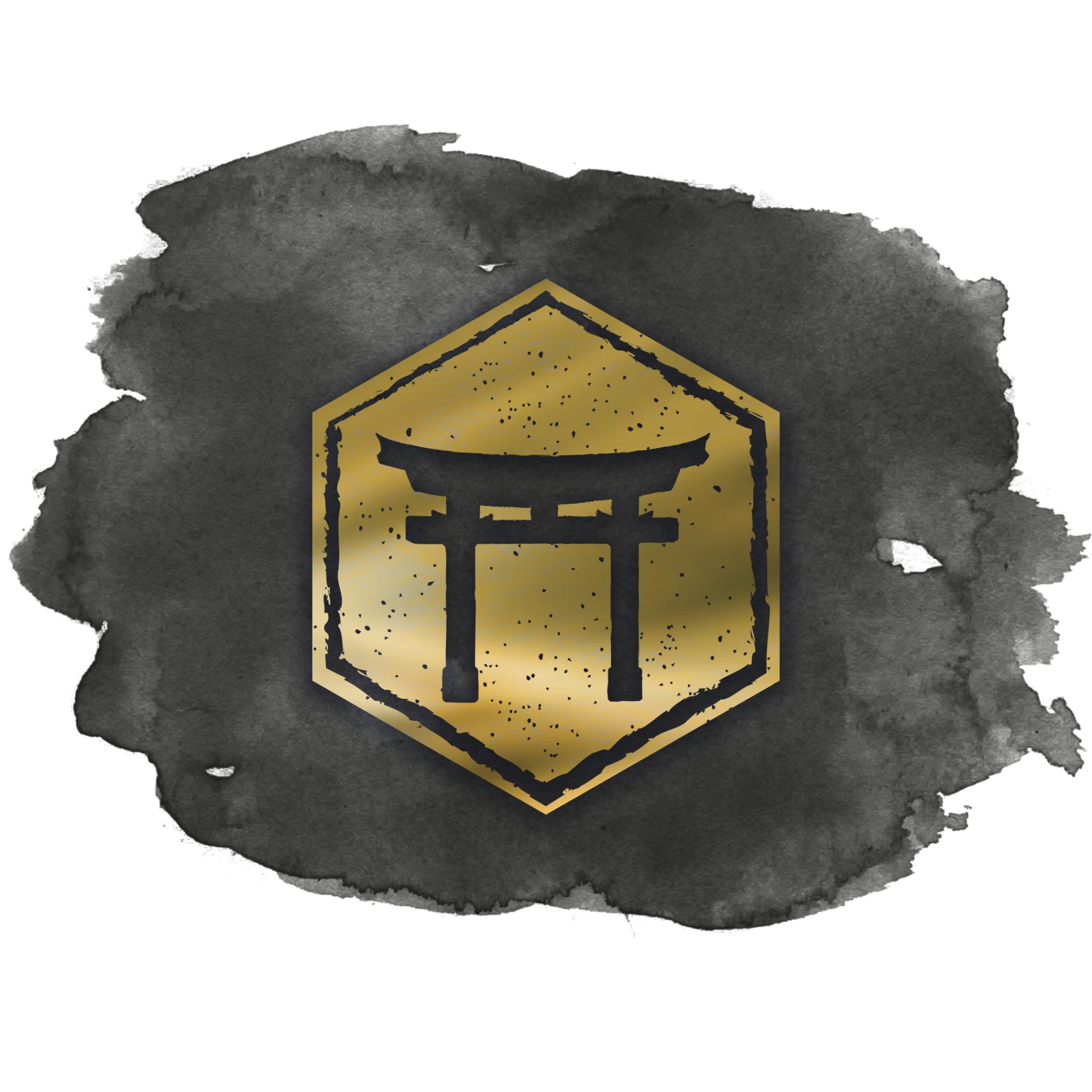
Tāke watched the moths dance around his boat’s lanterns, which hovered just above the water’s surface. They weren’t necessary, as the full moon’s reflection cast enough light to identify which of the nighttime riverboats were his. No one else seemed to notice them, much less his own boat, anchored just within sight of the port town and its quiet shrine.
Kyozo exhaled as he peered through his spyglass. His voice spiked with excitement. “You were right. There. The shipment.”
A string of barges, tied together, floated toward the port, guided by the bonfire at the top of the lighthouse. Lanterns along the deck illuminated the heraldry of several samurai families: a crane holding a spear, a carp jumping out of the water. They otherwise looked like ordinary trade barges. One would never guess the shrine’s tithe sat below the deck, or the wealth in other goods.
Kyozo collapsed the spyglass. “Your orders, captain?”
“Make the signal.”
Drawing a bow from the deck, Kyozo unleashed a screeching arrow. It whistled across the dark waters. Then, from the decks of several boats came the first volley of flaming arrows.
A dozen bright flowers bloomed in colorful blasts across the hapless barge decks. The night broke in a peal of thunder. A wall of flame arose above doomed screams.
Kyozo laughed as the second volley fell. “I guess that’s why they call you Bakuchiku,” he said. “The firework prince.”
The man who’d called himself Tāke grinned. “That’s why I’m the lord of the river pirates.”
Bakuchiku watched as the boats under his command tightened their net around their prey. The gold plates within those barges – and the other treasures – would make them rich beyond their wildest dreams. Even better, it would put the samurai families in their place. Those who claimed the title “samurai” were once bandits themselves. But their time was ending; soon this entire river would know his name. Let this be the funeral pyre of the river lords. Let the river’s bounty belong to whoever had the strength to take it.
The fires spread across the decks as another volley exploded in the sky. The shrine’s banners caught blaze, spreading fast among distant screams. Bakuchiku dipped his fingers into the cold river.
The billowing fires reflected across the surface, painting its waters in a brilliant hue of gold.

River of Gold continues with Part 2: The Business of the Crab. Learn more and get your copy of River of Gold, the exciting new game in the world of Legend of the Five Rings, here.


